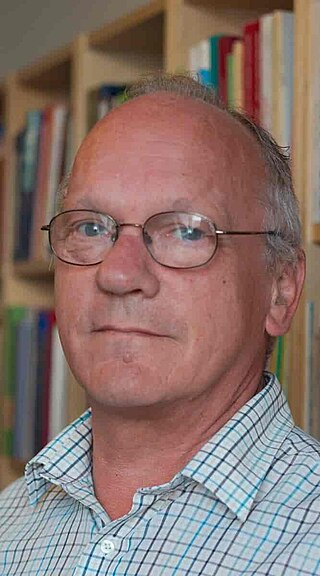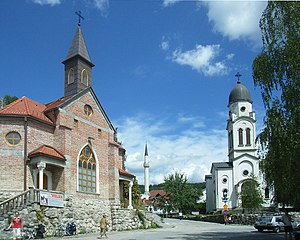Ilm al-kalam or ilm al-lahut, often shortened to kalam, is the scholastic, speculative, or philosophical study of Islamic theology (aqida). It can also be defined as the science that studies the fundamental doctrines of Islamic faith, proving their validity, or refuting doubts regarding them.
Political aspects of Islam are derived from the Quran, ḥadīth literature, and sunnah, the history of Islam, and elements of political movements outside Islam. Traditional political concepts in Islam include leadership by elected or selected successors to Muhammad, known as Caliphs in Sunnī Islam and Imams in Shīʿa Islam; the importance of following the Islamic law (sharīʿa); the duty of rulers to seek consultation (shūrā) from their subjects; and the importance of rebuking unjust rulers.

Bassam Tibi, is a Syrian-born German political scientist and professor of international relations specializing in Islamic studies and Middle Eastern studies. He was born in 1944 in Damascus, Syria to an aristocratic family, and moved to West Germany in 1962, where he later became a naturalized citizen in 1976.
Maturidism is school of Islamic theology within Sunni Islam named after theologian Abu Mansur al-Maturidi in the 9th–10th century. Maturidi theology is considered one of the orthodox creeds of Sunnī Islam alongside Atharism and Ash'arism, and prevails in the Ḥanafī school of Islamic jurisprudence.
The Dom are descendants of the Dom caste with origins in the Indian subcontinent which through ancient migrations are found scattered across the Middle East and North Africa, the Eastern Anatolia Region, and parts of the Balkans and Hungary. The traditional language of the Dom is Domari, an endangered Indo-Aryan language, thereby making the Dom an Indo-Aryan ethnic group.
The Ashkali, otherwise known as Hashkali and/or Balkan Egyptians, are Albanian-speaking Muslim ethnic cultural minorities, which mainly inhabit Kosovo and southern Serbia, as well as Albania, Montenegro, and North Macedonia. Prior to the Kosovo War of 1999, the Balkan Egyptians or Ashkali people registered themselves as Albanians. While some Ashkali speak Romani, Egyptians usually do not. The two groups are not clearly delineated. On the other hand, they differ linguistically and culturally from the Roma, even though they have often been grouped together under the acronym RAE.

Islam in Bulgaria is a minority religion and the second largest religion in the country after Christianity. According to the 2021 Census, the total number of Muslims in Bulgaria stood at 638,708 corresponding to 9.8% of the population. Ethnically, Muslims in Bulgaria are Turks, Bulgarians and Roma, living mainly in parts of northeastern Bulgaria and in the Rhodope Mountains.

Islam is the most widespread religion in Bosnia and Herzegovina. It was introduced to the local population in the 15th and 16th centuries as a result of the Ottoman conquest of Bosnia and Herzegovina.

Turkish people or Turks are the largest Turkic people who speak various dialects of the Turkish language and form a majority in Turkey and Northern Cyprus. In addition, centuries-old ethnic Turkish communities still live across other former territories of the Ottoman Empire. Article 66 of the Turkish Constitution defines a Turk as anyone who is a citizen of Turkey. While the legal use of the term Turkish as it pertains to a citizen of Turkey is different from the term's ethnic definition, the majority of the Turkish population are of Turkish ethnicity. The vast majority of Turks are Muslims and follow the Sunni and Alevi faith.

Islamic schools and branches have different understandings of Islam. There are many different sects or denominations, schools of Islamic jurisprudence, and schools of Islamic theology, or ʿaqīdah (creed). Within Islamic groups themselves there may be differences, such as different orders (tariqa) within Sufism, and within Sunnī Islam different schools of theology and jurisprudence. Groups in Islam may be numerous, or relatively small in size.
Cultural Muslims, also known as nominal Muslims, non-practicing Muslims or non-observing Muslims, are people who identify as Muslims but are not religious and do not practice the faith. They may be a non-observing, secular or irreligious individuals who still identify with Islam due to family backgrounds, personal experiences, ethnic and national heritage, or the social and cultural environment in which they grew up. However, this concept is not always met with acceptance in conservative Islamic communities.

Islam is the second-largest religion in Europe after Christianity. Although the majority of Muslim communities in Western Europe formed recently, there are centuries-old Muslim communities in the Balkans, Caucasus, Crimea, and Volga region. The term "Muslim Europe" is used to refer to the Muslim-majority countries in the Balkans and the Caucasus and parts of countries in Eastern Europe with sizable Muslim minorities that constitute large populations of indigenous European Muslims, although the majority are secular.

Islam is the second largest religion in Norway after Christianity. As of 2023, the number of Muslims living in Norway was 182,607. The majority of Muslims in Norway are Sunni, with a significant Shia minority. 55 percent of Muslims in the country live in Oslo and Viken. The vast majority of Muslims have an immigrant background, and very few Norwegians are Muslim.
Monotheism—the belief that there is only one deity—is the focus of the Abrahamic religions, which like-mindedly conceive God as the all-powerful and all-knowing deity from whom Abraham received a divine revelation, according to their respective narratives. The most prominent Abrahamic religions are Judaism, Christianity, and Islam. They, alongside Samaritanism, Druzism, the Baháʼí Faith, and Rastafari, all share a common core foundation in the form of worshipping Abraham's God, who is identified as Yahweh in Hebrew and called Allah in Arabic. Likewise, the Abrahamic religions share similar features distinguishing them from other categories of religions:

Jørgen Schøler Nielsen is a former Professor of Islamic Studies at the University of Copenhagen. In October 2007, he assumed a five-year research chair within the Faculty of Theology, where he leads the Centre for European Islamic Thought. He holds degrees in Arabic and Middle Eastern Studies from the School of Oriental and African Studies, London, and a PhD in Arab history from the American University of Beirut. He has concentrated his research on the situation of Muslims in Europe with related interests in the Islamic debate over religious pluralism and relations with the West. He has also worked as a consultant to the EU Presidency and the Council of Europe on religious minorities, and to the Danish, Swedish and British foreign ministries on Islam and Europe.

The phrase false god is a derogatory term used in Abrahamic religions to indicate cult images or deities of non-Abrahamic Pagan religions, as well as other competing entities or objects to which particular importance is attributed. Conversely, followers of animistic and polytheistic religions may regard the gods of various monotheistic religions as "false gods", because they do not believe that any real deity possesses the properties ascribed by monotheists to their sole deity. Atheists, who do not believe in any deities, do not usually use the term false god even though that would encompass all deities from the atheist viewpoint. Usage of this term is generally limited to theists, who choose to worship some deity or deities, but not others.

Serb Muslims or Serb Mohammedans, also referred to as Čitaci, are ethnic Serbs who are Muslims by their religious affiliation.
The Islamization of Albania occurred as a result of the Ottoman conquest of the region beginning in 1385. The Ottomans through their administration and military brought Islam to Albania through various policies and tax incentives, trade networks and transnational religious links. In the first few centuries of Ottoman rule, the spread of Islam in Albania was slow and mainly intensified during the seventeenth and eighteenth centuries due in part to greater Ottoman societal and military integration, geo-political factors and collapse of church structures. It was one of the most significant developments in Albanian history as Albanians in Albania went from being a largely Christian population to one that is mainly Sunni Muslim, while retaining significant ethnic Albanian Christian minorities in certain regions. The resulting situation where Sunni Islam was the largest faith in the Albanian ethnolinguistic area, but other faiths were also present in a regional patchwork, played a major influence in shaping the political development of Albania in the late Ottoman period. Apart from religious changes, conversion to Islam also brought about other social and cultural transformations that have shaped and influenced Albanians and Albanian culture.
Reuven Firestone is an American academic and historian of religion, who serves as the Regenstein Professor in Medieval Judaism and Islam at the Hebrew Union College-Jewish Institute of Religion's Skirball Campus in Los Angeles and Affiliate Professor of Religion at the University of Southern California.
Gabriel Said Reynolds is an American academic and historian of religion, who serves as Jerome J. Crowley and Rosaleen G. Crowley Professor of Theology and assistant professor of Islamic Studies and Theology at the University of Notre Dame. His scholarship focuses on World Religions and World Church, History of Christianity, Qur'anic Studies, Origins of Islam, and Muslim-Christian relations.







